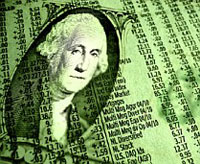US economy may retake leadership in a couple of years
Like a great battleship at sea, the US industrial and export machine is slowly turning around. Within a couple of years, its big guns will be sweeping the world again, ready to silence pious talk about America's trade deficit - and to menace chunks of Europe's manufacturing base.

The fast-inflating economies of China, emerging Asia and Eastern Europe will be reminded globalisation cuts both ways. Jobs can flow from Shanghai to Los Angeles.
US exports reached a record $140bn in September, powered by Prairie grains, Texas cotton, semiconductors, chemicals, even cars. "I put the US economy up against any in the world in terms of competitiveness - that's a fact," said US Treasury Secretary Hank Paulson.
The US trade deficit has fallen to $56.5bn, down 14pc in a year. The current account deficit has slimmed from 7pc of GDP in early 2005 to 5.5pc, and is narrowing fast. Bad, but no longer catastrophic.
This is the first fruit of devaluation, enough to hobble Airbus and prompt French president Nicolas Sarkozy to warn of "economic war" on Capitol Hill last week.
French industrial output fell 1.1pc in September. It is becoming ever clearer that Europe will suffer as much from America's housing crash as America itself, and perhaps more so. This is what happened after the US dotcom crash. Flexible economies rebound faster.
The world has barely begun to feel the impact of the latest dollar slide - to $2.11 against sterling, $1.47 against the euro, and 75.45 on the dollar index, the lowest since the Bretton Woods system collapsed. This will make itself felt over the next two years in countless ways, whether it be Volkswagen switching plant to the US, or the repatriation of software offices from India, where IT salaries have rocketed to $18 an hour.
Every 20 years or so, the punditocracy consigns America to the economic dustbin. Remember the chorus in the late 1980s telling us that Germany and Japan had mastered the art of wealth creation? The chatter peaked just as the 1988-1992 US export boom began to take off - after a dollar crash, of course, telegraph.co.uk reports.
As Pravda.Ru previously reported US economy should expand modestly in coming months as a healthy job market continues to trump weakness in housing prices.
The Conference Board said its index of leading economic indicators rose a higher-than-expected 0.3 percent in May, lifted by rising stock prices, higher consumer expectations and the availability of jobs.
Economists said that jobs should continue to be plentiful, despite an unexpected surge in jobless claims last week.
The Labor Department reported that unemployment claims totaled 324,000 last week, up 10,000 from the previous week, to the highest since mid-April.
While the big increase was unexpected, analysts said it did not change their view that the labor market remained hardy. Even with the increase, analysts noted that claims remained close to their average — 319,000 — over the first five months of the year.
Source: agencies
Subscribe to Pravda.Ru Telegram channel, Facebook, RSS!



